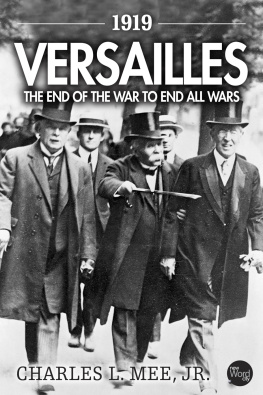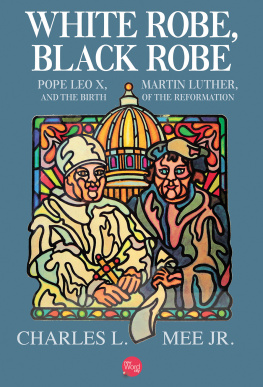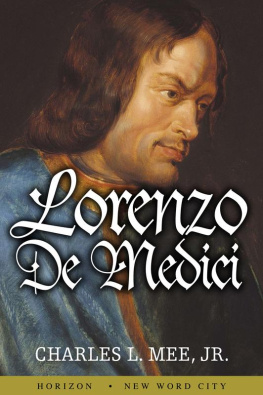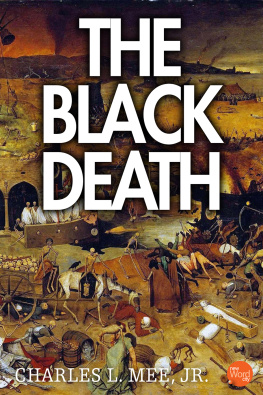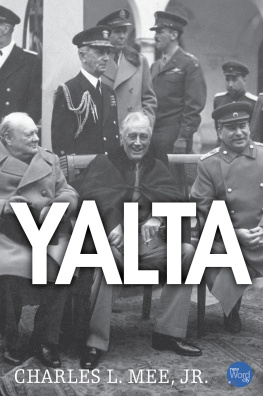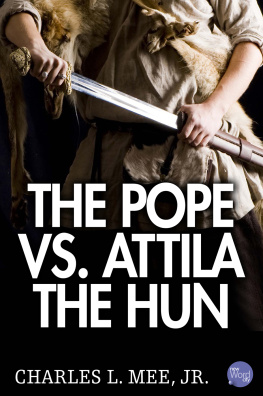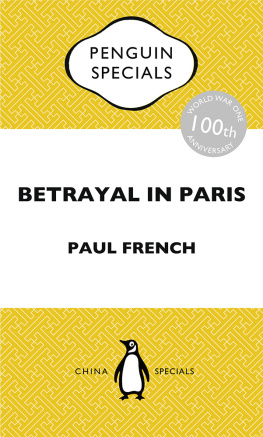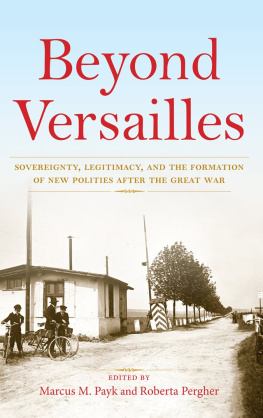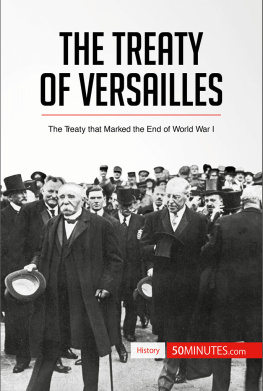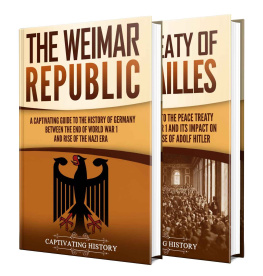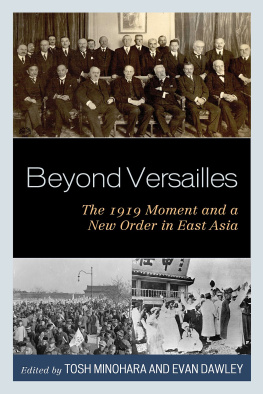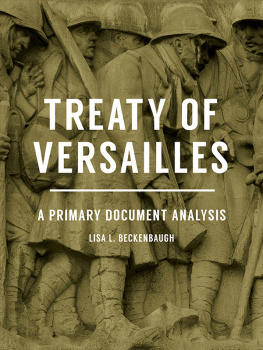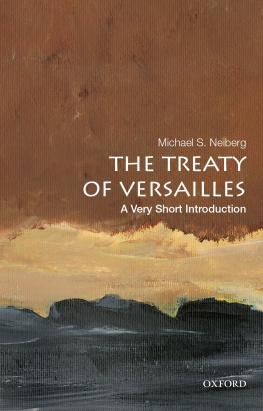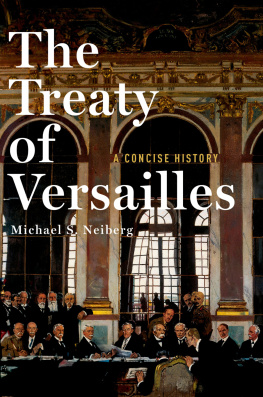At the end of World War I, the representatives of the victorious nations gathered in Paris to sort through the ruins and carnage of the war, and to see whether they could find some new form amidst the appalling desolation. The United States was represented by Woodrow Wilson, Great Britain by David Lloyd George, France by Georges Clemenceau but these three were only the most conspicuous among the frock-coated Foreign Office men, the generals, motorcycle messengers, aides and gossip columnists, society matrons and modern dancers, Walter Lippman and Sarah Bernhardt, Ho Chi Minh and Lawrence of Arabia, Marcel Proust and the Maharajah of Bikaner, and the crowd of others who converged on Paris to press their cases before the mighty, the influential, the press, and one another.
They labored for six months, from January through June of 1919, and signed at last at the Palace of Versailles what came to be called the Treaty of Versailles. Ordinarily the happenings and significance of such diplomatic gatherings can be understood by examining each of the positions taken by each of the participants, standing back to watch the give and take, and summing up the outcome.
At the end of the Great War, however, the diplomats confronted a world in fragments, a world that seemed to be in the midst of a massive psychic breakdown, of a breakdown of old combinations of states and of empires, of the disintegration of economic orders, of nineteenth-century capitalism, of the eruption of sudden disaster, of riots and assassinations, of tyranny and disorder, of frivolity and despair, exhilaration and dread on such an order of magnitude as to numb the mind.
When James T. Shotwell short, with square shoulders, straight back, and a full, forceful moustache, the size of half a cigar arrived in Paris as the official librarian to the American delegation, he went to have tea at the studio of the expatriate painter Edwin Scott. The two of them had to eat johnnycakes and syrup, because there was no bread in parts of Paris. Scott stood by the window overlooking his garden where a shell from the German long-range artillery had destroyed the plantings and thrown up earth against the houses. Across the way, a bomb had smashed a house on the Boulevard Raspail, and Scott said that he had not been able to concentrate or rest and had done little painting during the war.
Winter in Paris was unpredictable some days wet and cold, icy enough to freeze the blood. Food and coal were in short supply. Some days were mild and beautiful, with clear skies at night, not at all cold, no heavy frost, grass green in the parks, even some flowers in bloom, a false spring that came and went disconcertingly. Near the Place de la Concorde, on one of the quays by the Seine, a trio girl with violin, man with guitar, chanteuse sang of the nouvelle poque.
When Shotwell dined with Sylvain Lvi, a distinguished French orientalist, Shotwell noticed ice-cold and pitch-black corridors and a little heat in a grate stove, which [the Lvis] seemed to find very comfortable after the real hardships of the war. Professor Lvi has begun his courses at the Collge de France, but he says that it is impossible to take up the old subjects again with anything like the detachment of the scientific mind. His interest in the archaeology of India is only casual compared with his interest in the present.
World War I had been a tragedy on a dreadful scale. Sixty-five million men were mobilized more by many millions than had ever been brought to war before to fight a war, they had been told, of justice and honor, of national pride and of great ideals, to wage a war that would end all war, to establish an entirely new order of peace and equity in the world.
But far from resolving the conflicts that had begun the war, the war had let loose even more turmoil. By November 11, 1918, when the armistice that marked the end of the war was signed, eight million soldiers lay dead, twenty million more were wounded, diseased, mutilated, or spitting blood from the gas attacks. Twenty-two million civilians had been killed or wounded, and the survivors were living in villages blasted to splinters and rubble, on farms churned to mud, their cattle dead.
In Berlin and Belgrade and Petrograd, the survivors fought among themselves fourteen wars, great or small, civil or revolutionary, flickered or raged about the world. Thirteen million tons of shipping had been sunk; 10, 000 square miles of northern France had been ruined; 1, 200 churches were destroyed along with 250, 000 other buildings. Hundreds of square miles of central and Eastern Europe were in even worse condition. In Poland, people traded with German marks, Austrian krnen, Polish marks that had been issued by the Germans, Russian rubles all plagued by uncertain exchange rates and runaway inflation. Prices rose in Austria by a factor of 14,000, in Hungary by 23,000, in Poland by 2,500,000, and in Russia by 400,000,000. And people starved all across Europe.
In central Europe, a member of a relief commission reported that in countries where I found wagons I found a shortage of locomotives; where there were locomotives, there was a shortage of wagons; where coal lay at the pithead there were no wagons and where wagons waited, men were not available to work the coal. In many parts of Poland, children were dying for want of milk and adults were unable to obtain bread or fats. In eastern districts the population was living on roots, grass, acorns, and heather. Those who managed to survive the war and the revolutions and the violence and the privations were stunned by an epidemic of influenza that struck and spread and struck and spread again in the last spasm of the war and killed yet another six million people.
Four great empires had fallen the German, Austro-Hungarian, Turkish or Ottoman, and the Russian and the Allied armies still fought on in Russia against the Bolsheviks, trying vainly to restore the White Russians to rule. The collapse of these empires gave birth to the great political drama that commenced at the Paris Peace Conference and continues to rage today: the conflict among the major powers to move into the old imperial domains and the struggle of the other nations to win independence altogether from imperialism.
Perhaps all of this turmoil could have been contained had the political collapse not occurred in the midst of a collapse of many of the traditional ideals and usages that had underlain the political order of the nineteenth century. But the war had discredited much of the rhetoric of national pride, honor, and sacrifice, as well as faith in the notions of reason, progress, humanism. Nor did the notions of God, representational art, or Newtonian physics appear to be in such good repair. The modern western civilization that had grown up since the Renaissance was under siege from outside, and from within, and offered scant support to the disintegrating political order.
By January of 1919, as the delegates gathered in Paris for the Peace Conference, the shallow graves of Verdun were being washed out by the rains; feet stuck out of the ground, and helmets with skulls in them rose up through the mud. In this atmosphere, the diplomats gathered and, far from restoring order to the world, they took the chaos of the Great War, and, through vengefulness and inadvertence, impotence and design, they sealed it as the permanent condition of our century.
THE SAVIOR
Woodrow Wilson sailed to Europe aboard the S. S. George Washington and landed at Brest on Friday, December 13, 1918 a date, Wilson thought, that was destined to bring him luck: thirteen was his lucky number because it was, among other things, the number of the letters in his name.

